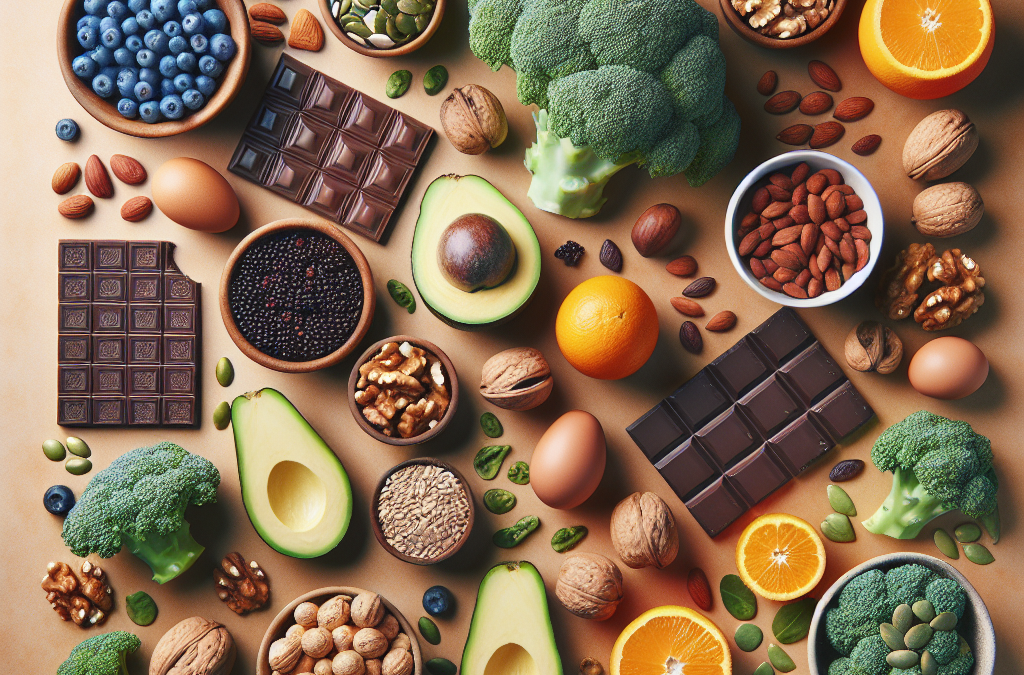Healthy Fats
Understanding the Role of Omega-3s
When I first learned about the importance of healthy fats for brain health, it was a total game changer for me. Omega-3 fatty acids, particularly those found in fatty fish like salmon, are known to boost cognitive function and even help fend off mental decline. Incorporating these into my meals not only made me feel better physically, but I could actually tell the difference in my focus and memory.
It’s not just fish, though! Chia seeds, flaxseeds, and walnuts are fantastic plant-based sources of omega-3s. I’ve started adding these to my smoothies or topping my yogurt with them. It’s super simple, and you really don’t have to complicate things to get these healthy fats into your diet.
So, if you want to support your cognitive function, seriously consider loading up on healthy fats like omega-3s. It’s been an integral part of my journey towards better brain health, and I’m so glad I made the change!
Antioxidant-Rich Foods
The Power of Berries
I can’t get enough of berries! They’re not just delicious; they pack a punch when it comes to antioxidants. Strawberries, blueberries, blackberries—they all contain high levels of antioxidants that help protect our brain cells from oxidative stress. I’ve made it a habit to throw a handful in my morning oatmeal or as a mid-day snack to keep my brain buzzing.
Research suggests that these colorful fruits can improve communication between brain cells and enhance cognitive functions, like memory and concentration. Trust me, when I prioritize these in my diet, I notice I’m sharper and more alert.
So, whether it’s adding them to your cereal, salads, or smoothies, consider making berries your go-to snack! They’re not only good for you; they’re a flavorful burst of health.
Leafy Greens
Why Spinach and Kale Should Be Your Best Friends
I used to think leafy greens were just for salad lovers, but I’ve learned to embrace them whole-heartedly! Spinach, kale, and even collard greens are rich in vitamins and minerals that support brain health—like vitamin K, lutein, and beta carotene. Just sneaking these greens into my daily diet has been a game changer.
I’ve discovered tons of fun and easy ways to incorporate them—like whipping up a green smoothie in the morning or tossing some spinach into my pasta dishes. It’s amazing how a small handful can transform a meal and supercharge my nutrients.
Don’t shy away from experimenting with different recipes. The more you enjoy your greens, the more likely you are to stick with them. Trust me, your brain will thank you later!
Whole Grains
Energy for Your Brain
Whole grains are another important piece of the cognitive puzzle. Foods like oats, quinoa, and brown rice provide the brain with a steady source of energy, which helps enhance focus and concentration. I find that switching to whole grains has drastically improved my energy levels throughout the day!
Get an Amazing Discount on the Best Certified Organic Whole Food Supplement!
Plus, whole grains are packed with fiber and essential nutrients, which are crucial for overall health. I love starting my day with a bowl of oatmeal topped with fruit and nuts—it keeps me full and energized without the dreaded midday slump.
Incorporating more whole grains is easy and tasty. Substitute white rice for brown or throw some quinoa into your salads. Your brain deserves the best fuel to keep those gears turning smoothly!
Fermented Foods
The Gut-Brain Connection
Here’s a fun one—fermented foods are not just cool hipster trends; they play a crucial role in our brain health! Items like yogurt, kefir, and sauerkraut are loaded with probiotics that support gut health, which in turn can impact our cognitive function. I’ve started my mornings with yogurt topped with granola and fruits, and it sets a positive tone for my day.
Research suggests that a healthy gut can lead to improved brain function and mood. That makes sense, right? If you feel good physically, you’re more likely to feel good mentally! I’ve felt a significant difference in my mood and clarity since I added more fermented foods to my diet.
Try incorporating these into your meals or snacks, and see how your mood and cognition change over time. It’s a simple step that could yield big results!
FAQs
What are the best foods to support cognitive function?
Incorporating healthy fats, antioxidant-rich foods, leafy greens, whole grains, and fermented foods can greatly support cognitive function.
How often should I include these foods in my diet?
Try to include a variety of these foods in your meals daily. Making small changes over time can lead to lasting benefits.
Can I get enough nutrients from supplements?
While supplements can help, it’s best to get nutrients from whole foods, as they contain a complex mix of vitamins and minerals that work together to support brain health.
Are there foods I should avoid for better cognitive function?
Yes, try to limit processed foods, excessive sugars, and unhealthy fats, as they may negatively impact your brain health.
How long will it take to see improvements in cognitive function?
Improvements can vary from person to person, but consistent healthy eating can lead to noticeable boosts in mood and cognitive performance in a matter of weeks.




